The Trial of Christine Keeler
Amanda Coe
Novelist and Screenwriter
Screenwriter Amanda Coe explains what drew her to the story of the 1961 affair between John Profumo, the Secretary of State for War in Harold Macmillan's Conservative government, and Christine Keeler, and her subsequent trial. The Trial of Christine Keeler begins on ±«Óãtv One and ±«Óãtv iPlayer on Sunday 29th December and continues on Monday 30th December at 9pm.
Watch the trailer for The Trial of Christine Keeler
What was it particularly about Christine Keeler’s story that interested you?
It arose from a conversation I had with about our next project, because we’d worked together very successfully before [on ]. She mentioned the Profumo Affair as a subject and it so happened that I’d just been on holiday and one of the books I’d read, and very much enjoyed, was the excellent Richard Davenport-Hines book, . It is a brilliant cultural history of the Profumo Affair, looking at all the different aspects of it in terms of where British society was at that time and why it was such a flashpoint. I’d been thinking, wouldn’t it be great to make a drama about that?
It was an opportune conversation with Kate about what it would feel like to be 19 years old and at the centre of this unbelievable and unprecedented amount of attention from the press, from the government and from the public. What would that actually be like? That seemed like a really great starting point for a drama.
What must it have been like for Christine Keeler to be at the centre of this?
I think it was unimaginably overwhelming for her. Even if we think in terms of what that would feel like to a 19 year-old today, when almost every 19 year-old in Britain has a degree of sophistication about presentation in the media, particularly within our age of social media. We know how stressful that can be for young people today, but the amount of attention paid to Christine and Mandy Rice-Davies in the press back then was absolutely unprecedented. I think it was extraordinary.

Christine Keeler (SOPHIE COOKSON)
Where did you start the process?
My journey in writing the scripts started with absorbing some of the huge amount of material that’s in the public domain. I started with the many versions of Christine's autobiography which were published in her lifetime. With that of course, you are always aware that you’re hearing a particular mediation of her voice and of her story, so even then there are different versions of her own story competing with each other.
Mandy Rice-Davies also wrote a couple of autobiographies and there were lots of really excellent books about the more granular aspects of the political scandal and MI5’s involvement. There are so many different layers to the story that for me it was really cutting across that detail and having a sense of just the narrative in terms of what happened to who and when. That’s a big part of crunching down the chronology of the story so that you can begin to find the really good dramatic moments.
What were the essential parts that you wanted to focus on that you felt told this story in a way that hadn’t been told before?
In truth this was an affair between a middle aged powerful man and a teenage, powerless young woman. I just thought about what that must have been like and wanted to explore the transaction between them. We know it was primarily a sexual transaction, but what were those private scenes like? I can imagine the awkwardness and the fact that they had very little in common. In truth, apart from an attraction, and the mutuality of that attraction is debatable at best, I don’t think there could have been anything else.
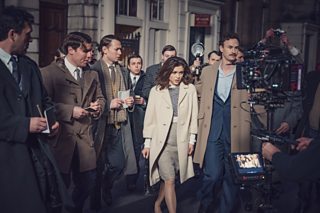
Christine Keeler (SOPHIE COOKSON), Paul Mann (JACK GREENLEES)(Image Credit: ±«Óãtv/Ecosse Films/Ben Blackall)
How did you find Christine’s voice?
Finding Christine’s voice was a really crucial part in writing a drama about her. In some of the interview material available online you have the impression that it’s not her real voice. It’s almost as if she had learnt to speak in a certain way and it doesn’t feel authentic. So it was also helpful to discover the facts about her early life, what that must have been like for her, and then filling in the bits in between. The bits about what it’s like to be a teenager or what it feels like to be powerless. Then I came across a really great bit of research, which was a transcript of a tape that was crucial to one of the court cases. It was later used as a piece of evidence in her perjury trial. It was really exciting because off the page came this very fresh, unfiltered, irreverent, quite funny, quite wayward and unpredictable voice. I took that as a starting point, a touchstone for her voice.
How did you set about finding the voices of the other characters?
One of the great pleasures of writing this drama, that I discovered right at the beginning of the process, is that there is no better time to tell this story than now. Add to that the more atavistic side of the writer, the side that just likes digging down and thinking, you get to create all these different characters and their different voices with all their very wide variety of registers and tones.
It was really important to look in the research as broadly as possible to get different voices. When explaining why it was important to look at this story now we only have to look at the recent Me Too and Windrush news stories to see why it’s relevant. With that in mind, Lucky Gordon and Johnny Edgecombe are both young men who arrived in the UK with certain expectations. To then encounter the severe limitations that were put in front of them in terms of the employment they could find, the racism they faced and what they felt about the women they met was so different from all that they had hoped for. That was fascinating and it felt an essential part of the whole story, rather than it all being about a lofty politician and a young woman. I wanted it to be a rounded view of the whole story surrounding that period.
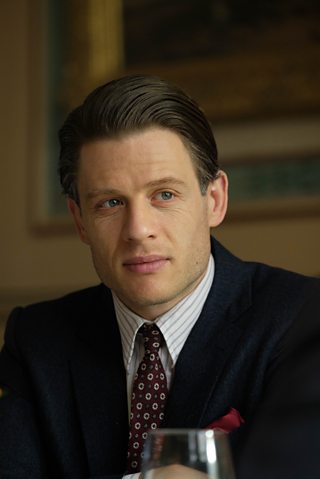
Stephen Ward (JAMES NORTON)(Image Credit: ±«Óãtv/Ecosse Films/Joss Barratt)
Why is it called The Trial Of Christine Keeler?
When I looked into the story more deeply I was surprised that most people knew about Stephen Ward’s trial, but not a lot was known about Christine’s. Her trial didn’t end as dramatically as Stephen Ward’s, but it had a huge impact on her life. It seemed such a crucial part of the story that the criminal justice system turned against her. There were two elements to that, which were that Christine not only endured a criminal trial but also a trial of public opinion. She was vilified in the court of public opinion and there’s some restitution in seeing her side of the story, despite the consequences, which for Christine, were pretty horrific.
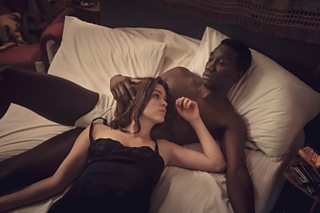
Christine Keeler (SOPHIE COOKSON), Johnny Edgecombe (NATHAN STEWART-JARRETT)(Image Credit: ±«Óãtv/Ecosse Films/Ben Blackall)
Did you get to speak to Christine Keeler about the project before she died?
We made contact with Christine through her legal representative, who was also a very close friend of hers, so she was aware of the project. She’d read an early treatment about the project and its approach. What she communicated was that she didn’t want to be portrayed as a victim, which I believe we’ve honoured.
When Kate and I then met up with Desmond Banks, her representative, he brought along a copy of this book about Jeremy Hutchinson’s case histories. Jeremy Hutchinson was the barrister who represented Christine in her libel case. Part of his case histories was his very famous summing up in her libel case, which was what’s called a plea of mitigation, where he tried to get her sentence reduced by giving a context for everything she’d gone through. I think at the time she found it really quite difficult to hear some of the things he was saying but if you read it, it’s actually an unusually compassionate view of Christine that I don’t think exists in any of the other material of the time.
Later in her life she came round to feeling that his was actually a really accurate and concise summing up of what her life was and how she’d arrived at that point. I was extremely conscious of that, particularly when I was writing episode six. That’s when you see Jeremy Hutchinson’s attitude towards Christine and her slightly contentious relationship with him, presenting this view to her. Christine didn’t want to be portrayed as a passive agent of persecution or a victim of other people’s desires, but there is no doubt that she suffered as a result of the events around her.

The Trial of Christine Keeler (Image Credit: ±«Óãtv/Ecosse Films/Ben Blackall)
How did you find the balance between telling the human story and the factual, historical political story? How do we see that balance play out in the drama?
I think with genuine historical material there’s always a delicate path to tread in a drama, in that you want to provide as much context as possible for the audience so that if they come to the story fresh it will still make sense. Equally it’s not a dry recitation of political facts. It’s the thing we dramatists always do which makes it human, and that’s to make it about the characters so you know what the stakes are.
How do you approach writing a historical period drama and bring in current universal themes that would appeal now, whether you know the backstory or not?
It’s interesting to inhabit a different visual world and a world where there are quite strong hierarchies, so that the sense of transgression is greater. You understand that and invest in it. I think what and have brought to their direction gives the story a real freshness and we talked about that a lot. Thematically it’s a 1960s origin story as much as it’s about this one particular young woman and her journey through the story. You could say that the affair between Profumo and Christine was about the end of the old, more rigid and calcified world of the 1950s and the beginning of the huge cultural earthquake of the 1960s. That element felt like it would always feel quite approachable for an audience and bring a modern edge.
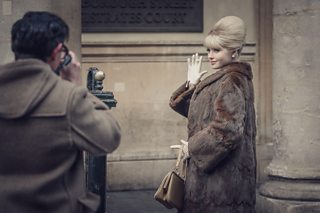
Mandy Rice-Davies (ELLIE BAMBER)(Image Credit: ±«Óãtv/Ecosse Films/Ben Blackall)
What are the key contrasts between then and now, in terms of the ripple effects of these events in modern times?
In terms of where we are now in viewing the affair and its consequences, what was really interesting in the series was seeing how many of the themes are so current at the moment, with the Me Too campaign being the obvious one. In a world of Non-Disclosure Agreements, what happens when you say to somebody you do not have ownership of your own experience? As human beings the one thing we all own is our experience. The idea that you can just write a cheque to get out of situation would be powerful at any time; the assumption that you can just make mistakes go away.
Our perspectives on the affair itself have changed because actually it’s not something we could imagine somebody resigning over now. Although what we see in our telling of the story is that it’s the lying that leads to Profumo’s resignation more than the affair itself. One thing that really struck me about revisiting this material was how young those girls were. It was just an assumption that it was OK for these older men to effectively pay or confer other advantages upon them in exchange for sex. Their ages didn’t come into it at all, and that just struck me when conducting my research.

Bill Astor (MICHAEL MALONEY), Valerie Profumo (EMILIA FOX), Bronwen Astor (ROSALIND HALSTEAD), Stephen Ward (JAMES NORTON)(Image Credit: ±«Óãtv/Ecosse Films/James Pardon)
There are two iconic moments associated with Christine: the Lewis Morley chair shot and Christine being discovered naked at the Cliveden pool by Profumo. Did you include those in the drama or did you steer away from them?
When I wrote the first draft of the first script, I hadn’t included either of those. But then Kate and I discussed that perhaps we do need a few iconic beats, but maybe we could show them in a slightly different way. There was a way to honour those moments, particularly a story like this, that has a quality of a national myth about it. There are certain things in terms of events that happened or language that was used which we incorporated. For example, the pool scene, the chair, Mandy’s phrase, "He would, wouldn’t he?"
I wanted to look at the pool scene from Christine’s point of view. What would it feel like for her to realise she was being watched? Could that have arisen from a more private moment, and how did she own that? In the drama you see her uncertainty initially, but then a sense of awareness that she has this power. However, is it really her power, or is it Profumo’s?
Christine, in at least one of her books or interviews, had given a very clear adamant account that despite looking like she was naked in the Lewis Morley chair shoot, she had in fact worn knickers. When she signed a publishing deal for her autobiography she also signed a no-nudity clause that she was obliged to fulfil. The photographer Lewis Morley very cleverly suggested that they could get around that by using a chair. Christine always claimed she pulled her pants out of the way in the shot and that to me seemed like a really great moment to show.
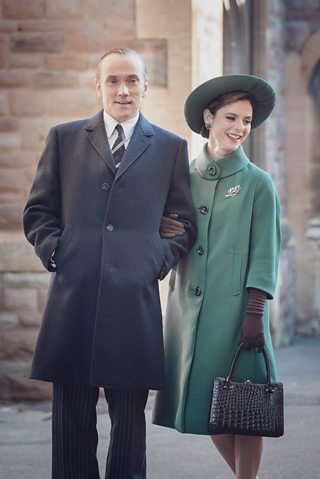
John Profumo (BEN MILES), Valerie Profumo (EMILIA FOX)(Image Credit: ±«Óãtv/Ecosse Films/Ben Blackall)
Why did you want to include Profumo’s wife Valerie as much as you did in the script?
I was fascinated by what went on behind the closed doors of that partnership and the betrayed politician’s wife. What are those conversations like? What agreement have they reached about how this might play out? From a dramatic point of view, it seemed really valuable to give her a voice and to see the character of Profumo challenged a bit more within his own world. We see him surrounded by his political cronies and being challenged in terms of his political position, but since his personal life was at stake as well it felt important that there was also somebody on equal terms, with whom he’d had a very different relationship.
I also felt that we have a lot of really great actresses in their 40s and 50s in this country, and while it’s great to have parts for younger women, it’s wonderful to write parts for older actresses.
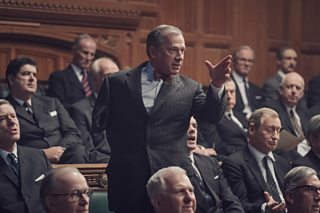
Rees-Davies (PAUL RYAN)(Image Credit: ±«Óãtv/Ecosse Films/Ben Blackall)
How did you want to portray Profumo?
It would’ve been easy to paint Profumo as a sleazy, slimy older politician who gets what he wants. However I think we have to think about the times that produced men like Profumo. He had a very distinguished war record and was only a young man when he fought in the Second World War. When I was researching him I had a strong sense of wanting to bring more complexity to his character. All the men around him would have fought in the war and that affected an entire generation. There was a sense of taking pleasure wherever you could get it, and I think Profumo was very much someone who lived in the moment and enjoyed it regardless of the consequences. He was drawn to danger and risk like a magnet. It makes for a more interesting drama that we see his point of view.
Christine states in the drama that she has ‘to fancy’ the men she dates. What is it about Profumo that she is attracted to?
Looking at the material and available photos, Profumo is no dreamboat - but Christine did say he was charismatic, and she was not alone in thinking that. There had to be a mutual attraction to their quite fleeting bond, and we must remember he didn’t force himself on her. One of the things about Christine’s choices around men which is important to consider is the way in which Christine and Mandy were just written off as sluts and prostitutes. The idea that they would get pleasure from sleeping with the men they slept with didn’t seem to compute with society at the time.
Read the scripts for Amanda Coe's adaptation of Apple Tree Yard
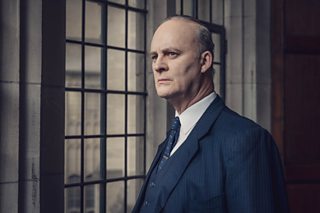
Martin Redmayne MP (TIM McINNERNY)(Image Credit: ±«Óãtv/Ecosse Films/Ben Blackall)
